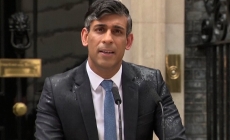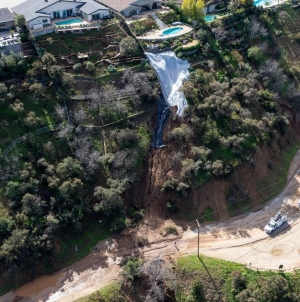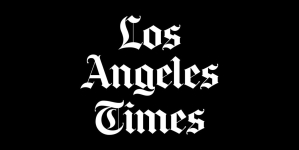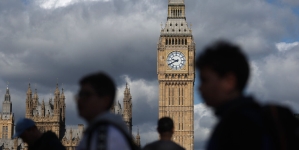-
Sunak Announces U.K. General Elections for July 4 - May 23, 2024
-
A portion of Mulholland Drive, damaged by mudslides in winter storms, reopens - May 26, 2024
-
‘Maybe You Don’t Want to Win’ - May 26, 2024
-
Donald Trump Putting Law Enforcement in Danger: Attorney - May 26, 2024
-
Avoid the waters of these 5 L.A. County beaches this holiday weekend, public health officials say - May 26, 2024
-
Bawdy Comedy ‘Anora’ Wins Palme d’Or at Cannes Film Festival - May 26, 2024
-
Map Shows Heat Wave Zone Spread Into Five New States - May 26, 2024
-
Azusa police arrest suspected slingshot-wielding vandal - May 25, 2024
-
Donald Trump Hammers Judge Ahead of Jury Instructions - May 25, 2024
-
Sometimes U.S. and U.K. Politics Seem in Lock Step. Not This Year. - May 25, 2024
Sunak Announces U.K. General Elections for July 4
Prime Minister Rishi Sunak of Britain on Wednesday called a snap general election for July 4, throwing the fate of his embattled Conservative Party to a restless British public that appears eager for change after 14 years of Conservative government.
Mr. Sunak’s surprise announcement, from a rain-spattered lectern in front of 10 Downing Street, was the starting gun for six weeks of campaigning that will render a verdict on a party that has led Britain since Barack Obama was America’s president. But the Tories have discarded four prime ministers in eight years, lurching through the serial chaos of Brexit, the coronavirus pandemic and a cost-of-living crisis.
With the opposition Labour Party ahead in most polls by double digits for the last 18 months, a Conservative defeat has come to assume an air of inevitability. For all that, Mr. Sunak is calculating that Britain has had just enough good news in recent days — including glimmers of fresh economic growth and the lowest inflation rate in three years — that his party might be able to cling to power.
“Now is the moment for Britain to choose its future,” Mr. Sunak said as pelting rain drenched his suit jacket. The choice for voters, he said, was to “build on the future you’ve made or risk going back to square one.”
Political analysts, opposition leaders and members of Mr. Sunak’s own party agree that the electoral mountain he must climb is Himalayan. Burdened by a weak economy, a calamitous foray into trickle-down tax policies, and successive scandals, the Tories have seemed exhausted and adrift, split by internal feuds and fatalistic about their future. They face a threat on the right from the anti-immigrant Reform U.K. party.
“The Conservatives are facing a kind of extinction-level event,” said Matthew Goodwin, a professor of politics at the University of Kent who has advised Boris Johnson and other party leaders. “They look like they’re going to suffer an even bigger defeat than they did to Tony Blair in 1997.”
Other political analysts were more cautious: Some pointed out that in 1992, the Conservative government of Prime Minister John Major overcame a deep polling deficit to eke out a narrow victory and stay in power.
Still, since the party won by a landslide in the 2019 elections on the slogan “Get Brexit done,” the Tories have bled support among young people, traditional Conservative voters in the England’s south and southwest and, crucially, working-class voters in the industrial Midlands and north of England, whose backing in 2019 was key to then-Prime Minister Boris Johnson’s landmark victory.
Many are disillusioned by the scandals of Mr. Johnson’s tenure, including Downing Street social gatherings that breached Covid lockdown rules, and even more so by the fiasco of his successor, Liz Truss, who was toppled after just 44 days, following proposed tax cuts that rattled financial markets, caused the pound to torpedo and fractured the party’s reputation for economic competence.
While Mr. Sunak, 44, steadied the markets and has run a more stable government than his predecessors, critics say he never developed a convincing strategy to recharge the country’s growth. Nor did he fulfill two other promises: to cut waiting times in Britain’s National Health Service and to stop the stream of small boats carrying asylum seekers across the English Channel.
Many voters in the “red wall” districts — so called because of Labour’s campaigning color — appear ready to return to their roots in the party. Under the competent, if uncharismatic, leadership of Keir Starmer, Labour has shaken off the shadow of his left-wing predecessor, Jeremy Corbyn.
Mr. Starmer, a former government prosecutor, has methodically overhauled Labour, purging allies of Mr. Corbyn, uprooting a legacy of anti-Semitism in the party’s ranks and pulling its economic policies more to the center.
“We’ve changed the Labour Party, returned it once more to the service of working people,” Mr. Starmer said in remarks after Mr. Sunak. “Together we can stop the chaos, turn the page, start to rebuild Britain and change our country.”
Under British law, Mr. Sunak was obliged to an election by January 2025. Political analysts had expected him to wait until the fall to allow more time for the economy to recover. But in the wake of an announcement on Wednesday that inflation had fallen to an annual rate of 2.3 percent — just above the Bank of England’s target of 2 percent — he may have gambled that the news was as good as it is going to get.
Mr. Sunak may also be calculating that the government can put a first flight carrying asylum seekers to Rwanda in the air before the vote. That would allow him to claim progress on another of his priorities.
The Rwanda policy, which involves deporting asylum seekers to the African nation without first hearing their cases, has been condemned by rights campaigners, the courts and opposition leaders — and it has drawn a raft of legal challenges. But Mr. Sunak has made it a centerpiece of his agenda, because it is popular with the Conservative Party’s political base.
In his remarks, Mr. Sunak tried to paint Labour as lacking an agenda. “I don’t know what they offer — and in truth, I don’t think you do either,” he said. But his message was occasionally drowned out by the sound of Labour’s 1997 campaign anthem, “Things Can Only Get Better,” which blared from a demonstrator’s loudspeaker in a nearby street.
For Mr. Sunak, the son of parents of Indian heritage who emigrated from British colonial East Africa six decades ago, the decision to go to the voters earlier than expected is not completely out of character. In July 2022, he broke with Mr. Johnson by resigning as chancellor of the Exchequer, triggering the loss of cabinet support that ultimately forced Mr. Johnson out of power.
Mr. Sunak then mounted a spirited bid for party leader, losing out to Ms. Truss in a vote of the party’s 170,000 or so members. After Ms. Truss’s economic policies backfired and she was forced to resign, Mr. Sunak re-emerged to win the next contest, this time held only among members of Parliament from the Conservative Party.
Mr. Sunak inherited a forbidding set of problems: double-digit inflation, a stagnant economy and rising interest rates, which stung people in the form of higher rates on their home mortgages. Waiting times at the National Health Service, which is depleted after years of fiscal austerity, stretched into months.
Mr. Sunak had some early successes, including an agreement with the European Union that largely defused a trade impasse over Northern Ireland. He exceeded his goal of halving the inflation rate, which was 11.1 percent when he took over in October 2022. And there are signs that the economy is starting to turn.
Britain had an unexpectedly strong exit from a shallow recession at the start of this year, with the economy growing 0.6 percent. The International Monetary Fund upgraded its growth forecast for the country this year, while praising the actions of the government and the central bank.
But the good news could be fleeting. Inflation is expected to bounce back up again in the second half of this year, and April’s number was not as low as economists expected. That has led investors to rethink how soon the Bank of England might cut rates, almost ruling out that they will be lowered next month. Even expectations that rates will come down in August have diminished.
At the same time, the scope for further tax cuts before the election has narrowed. Data published on Wednesday showed that public borrowing was up. And the I.M.F. warned the government against tax cuts, arguing that Britain had huge demands for more public spending to improve its public services, including the N.H.S., while also needing to stabilize its public debt.
Ultimately, analysts said, it was these bottom-line realities that drove Mr. Sunak’s decision to go to the voters now, and it is the economy, rather than anything else, that will decide his, and his party’s, fate.
“You can talk about Partygate and Truss,” said Tim Bale, a professor of politics at Queen Mary University of London, referring to Mr. Johnson’s lockdown-breaching social gatherings. “But in the end, the factors that are going to decide this election are anemic growth and a state that is collapsing before our eyes.”
Eshe Nelson contributed reporting.
































